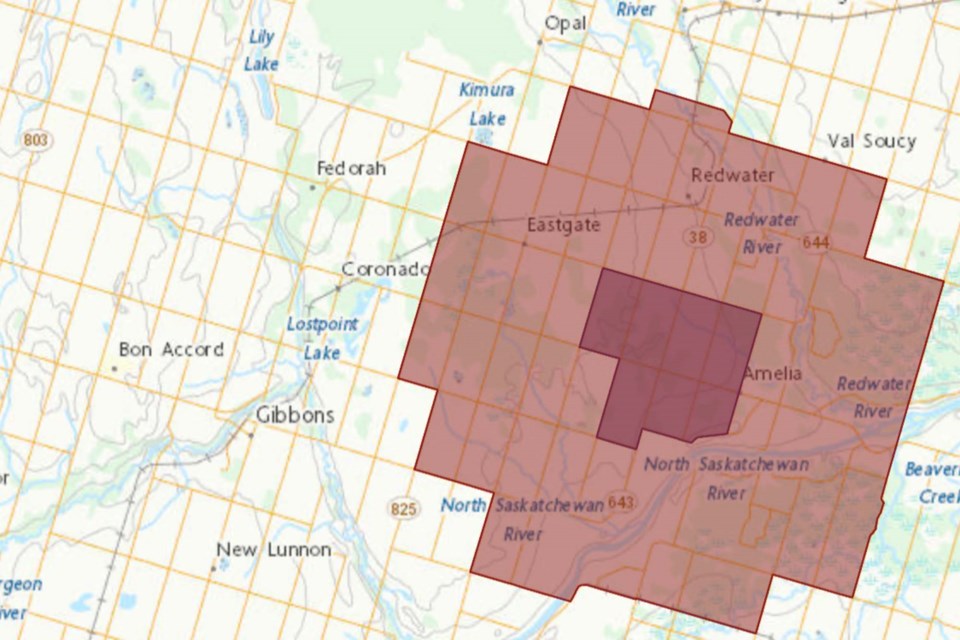A serious strain of avian influenza that swept through North America for the first time ever earlier this year has surfaced again in a specific area of Sturgeon County.
On Sept. 1, the Canadian Food Inspection Agency (CFIA) declared an outbreak of H5N1 — a highly pathogenic strain of avian influenza — throughout Redwater, Eastgate, Amelia, and the farmland in between. The boundaries of the detected outbreak down to specific range and township roads, as well as geographical coordinates, can be found on the CFIA's website.
In the designation order published by the CFIA, it states that the outbreak applies to commercial and non-commercial poultry.
"This includes day-old poultry and hatching eggs, eggs and other products or by-products of such captive domestic poultry, and things that have been exposed to such a bird, and other captive birds (including birds that are raised in captivity for racing, exhibitions, zoological collections, competitions, or pets) if movements may result in contact with commercial or non-commercial poultry or their facilities." the designation order reads.
In an email to The Gazette, the CFIA said, "cases of avian influenza are confirmed through laboratory testing when a producer or veterinarian reports signs of the disease in domestic birds.”
The CFIA said it does not share information about the specific operation, farm, or premises the disease was detected in.
"It is believed that infections have been associated with separate incidents of exposure to wild birds, either through direct contact or the virus being present in the environment near poultry operations and then unintentionally introduced into the barn."
As there is currently no treatment for avian influenza, infected birds or birds suspected of infection in an outbreak zone are required to be killed as part of the CFIA's disease management protocol.
"To date, [1,075,000] domestic birds in Alberta have been ordered destroyed or died from being infected with avian influenza,” the CFIA said in the email.
Virus of concern
Katharine Magor, a biological sciences professor at the University of Alberta who specializes in the study of avian influenza, says this particular strain of avian influenza presents significant challenges.
“What is spreading avian influenza is wild waterfowl, particularly ducks and geese," Magor said. "They brought it through Alberta in the spring, and we saw a lot of outbreaks and many commercial farms affected in the spring, but now those birds are coming back for their fall migration, and I think that that’s probably why we’re starting to see some cases and outbreaks.”
On Sept. 6 the CFIA also declared an outbreak in Strathcona County east of Fort Saskatchewan. Information on that outbreak can also be read on the CFIA website.
“In a commercial operation they keep very, very tight biosecurity to try and prevent any avian flu getting into a commercial operation," Magor explained. Biosecurity measures for a commercial poultry operation include strict control of the clothing and equipment worn by people in the facility, as well as intensive cleaning measures.
"It’s unusual that this [strain] persists through the season, and I really don’t know what that means for the future of chicken farming and also our potential exposure to wild birds," she said. "It’s definitely a virus of concern."
Magor explained that the virus does not easily infect people, nor does it easily spread between people.
“There’s relatively low danger to us currently because the strain does not spread easily between humans," she said. "If it did spread easily between humans, it would be a very, very serious virus."
In May of this year, the National Collaborating Centre for Environmental Health (NCCEH), a Canadian publicly funded health agency, reported that the mortality rate of H5N1 in humans is around 53 per cent. The NCCEH publication states that, up until May of this year, there were 862 reported cases in people worldwide between 2003 and 2021, resulting in 455 deaths.
Supporting farmers
Mike Froese, an Albertan egg farmer and member of the Alberta Poultry Industry Emergency Management Team (APIEMT), said in an interview that the experience of going through an outbreak as a farmer can be devastating.
"‘Why me? How can this happen? I’ve done everything right? What’s going on?’ — all of those things are the first thoughts," Froese said. "That would be every single solitary farmer’s first thoughts.”
The team, which is formed through members of Alberta Chicken Producers, Alberta Hatching Egg Producers, Alberta Turkey Producers, and Egg Farmers of Alberta, works with the CFIA and Alberta Agriculture to investigate cases of the disease and mitigate the risk of spreading.
Froese's role, he said, is to provide mental health and peer support to farmers dealing with an outbreak.
"It’s very hard on a farmer to go through this in the beginning," Froese explained. "You’re sitting there farming one day and then the next you're dealing with the government and CFIA and compensation and cleaning and disinfecting and none of it’s easy.
"My role is just to talk to people and let them know it’s going to be alright.”
As part of the CFIA's disease management strategy, farmers who have lost their flock can access financial assistance to recover after an outbreak.
"I know that in previous outbreaks they’ve been helpful, and I have nothing to say but good things about my experience dealing with CFIA," Froese said. "I found that the people in charge, the boots on the ground, the everyday people that you meet within the organization, all want to do the right thing and help you.
"That said, not everything goes as planned and some farmers have been frustrated with the process ... people do get the help they need, it just takes a lot longer than you think.”




